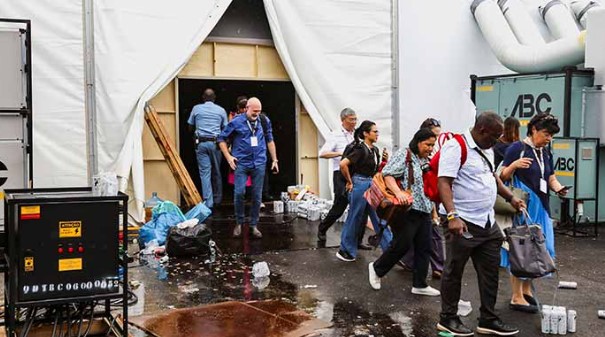
Talks at the COP30 climate summit in Brazil were disrupted on Thursday after a fire broke out in the venue, triggering an evacuation just as negotiators were hunkering down to try to land a deal to strengthen international efforts to address climate change.
United Nations Secretary-General Antonio Guterres had appealed earlier in the day for a deal from the summit, welcoming calls from some for clarity on the hotly disputed subject of weaning the world off fossil fuels.
Officials said the fire, which erupted at one of the country exhibition pavilions, had been brought under control with no injuries as security personnel ordered thousands of delegates in the sprawling building to go outside.
Brazil’s tourism minister Celso Sabino said he did not know when delegates would be able to return. Representatives for two separate negotiating teams, including the bloc representing small island states, said they left the venue awaiting instructions on when they could return.
The summit in the Amazon city of Belem, Brazil, had already missed a self-imposed Wednesday deadline to secure agreement among the nearly 200 countries present on issues including how to increase climate finance and shift away from fossil fuels.
Emissions from burning fossil fuels trap heat in the Earth’s atmosphere and are by far the biggest contributor to warming.
There are less than 48 hours until the scheduled end of the summit to find a consensus, which host nation Brazil has framed as a crucial step to ramping up international climate action and demonstrating that there is broad support to accelerate turning decades of promises and pledges from the COP summits into concrete action.
“One thing is clear, we are down to the wire, and the world is watching Belem,” Guterres said.
Fossil fuel rift
The two-week negotiation has become hung up on two issues – the future of fossil fuels and the delivery of climate finance – that expose criss-crossing fault lines between negotiating blocs from rich Western countries, oil producers and smaller states most vulnerable to climate change.
Taking their cue from Brazil, dozens of countries including both developed and developing nations have mounted a push for a roadmap setting out how countries should transition away from fossil fuels.
Others, including some fossil fuel-producing nations, are resisting.
The COP28 climate summit in 2023 agreed, after protracted discussion, to a transition, but nations have not mapped out how – or when – it will happen.
“I am perfectly convinced that a compromise is possible,” Guterres added.
Adapting to change
Another major sticking point in the negotiations is a reluctance among some richer nations to guarantee financing to help poorer countries adapt to a changing climate, according to three sources involved in the talks.
Developing countries are already deeply mistrustful of a $300 billion climate finance pledge made last year at the COP29 conference in Baku, particularly as the United States withdraws from climate cooperation under President Donald Trump.
Some existing climate finance has been directed to strange projects, including some that are funnelling billions of dollars back to rich nations, according to previous Reuters reporting.
“Right now, our people are losing their lives and livelihoods from storms of unprecedented strength which are being caused by warming seas,” said Steven Victor, Minister of Agriculture, Fisheries and the Environment for the Pacific island nation of Palau.
“If we leave Belem without a transformative outcome on adaptation for the world’s most vulnerable, it will be a failure,” he said.
European officials have said they agree adaptation financing is important, but that they were not authorised to agree to new targets.





